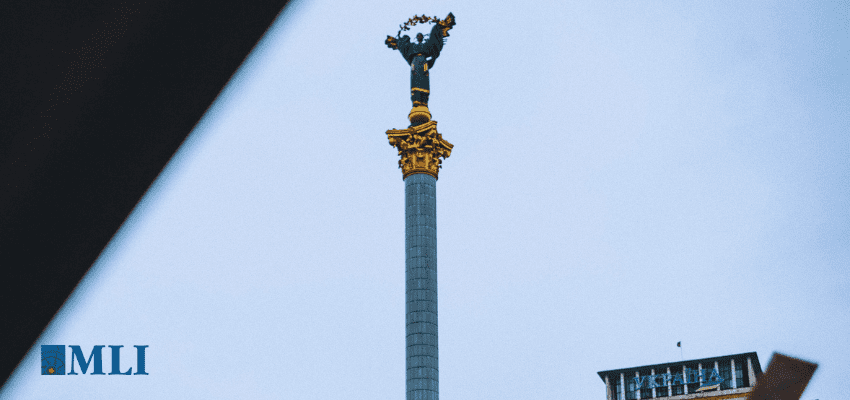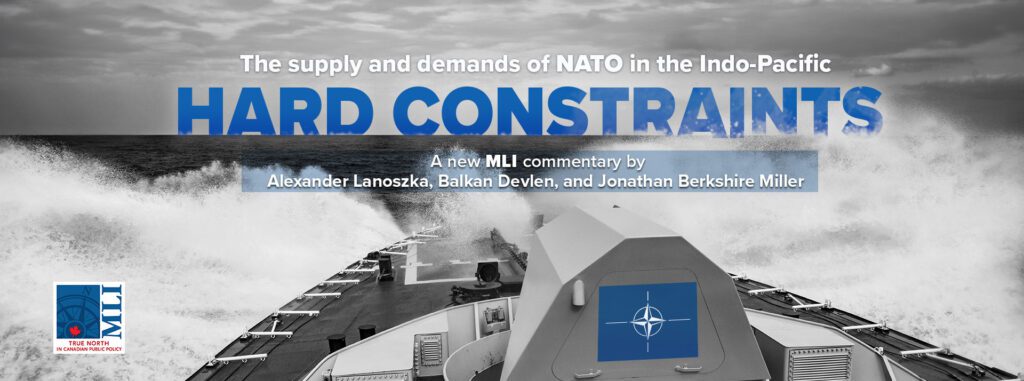This article originally appeared in the Globe and Mail.
By Chris Alexander, June 21, 2024
It was just a few words in Normandy between a 99-year-old veteran and a wartime leader.
“You’re the saviour of the people,” said retired U.S. Air Force staff sergeant Melvin Hurwitz.
“No, no: you saved Europe,” replied Ukrainian President Volodymyr Zelensky.
Two Jewish men, born worlds apart, grasp a simple truth: 80 years after D-Day, the fight for freedom is now on Ukraine’s shoulders.
For 10 years, Kyiv has been defending itself, at harrowing cost, against a Russian invasion.
In 2022, the Kremlin unleashed the full, hideous repertoire of totalitarian conquest, targeting hundreds of hospitals, clinics, schools, apartments and cultural institutions.
According to Ukrainian authorities, Moscow has forcibly abducted 19,500 Ukrainian children, cutting them off from their families, country and culture.
This is not just blood lust or casual indifference to human life: It is Russian fascism’s calculated, genocidal effort to wipe out Ukrainian identity, statehood and lives.
Canada’s response to Europe’s last genocide was D-Day. Yet today we have done relatively little; in fact, we shamefully withdrew our military trainers in early 2022, just before the Kremlin’s full-scale invasion.
Ukraine has been given a fraction of the air defence systems it needs, leaving Ukraine’s energy infrastructure open to destruction.
While a few F-16s may reach Ukraine later this summer, not a single Western fighter jet has yet joined the fight.
U.S. missiles are still prohibited from striking 84 per cent of the ground sanctuary Moscow’s military uses to target Ukraine.
We haven’t just left Ukraine to fight alone: So far, we have scaled back the UN Charter’s “inherent right of individual or collective self-defence” to benefit Russian fascism.
Jake Sullivan, President Joe Biden’s national security adviser and an architect of many of these restrictions, says his goal is to “hold the line” and “push back” – not defeat Russia’s army.
This is a losing strategy. If it was used in 1944, it would have left Europe in Nazi thrall.
Why are we so timid? A century of costly compromises with Moscow over periods of isolationism, containment and détente has left Western allies ill-equipped to help democratic Ukraine win. We are still reluctant to see Moscow’s invasion for what it is – a threat on a scale unparalleled since Hitler, Mussolini and Stalin.
To justify today’s foot-dragging, some still cite escalation risks – even though the Kremlin’s nuclear blackmail, meant to dampen Western support, has been exposed as empty threats.
To put our politics and economy back on sound footings, our societies need to adopt wartime postures, as we did in 1939, that make Russia pay for its crimes: transfer seized assets and reserves to Ukraine; toughen sanctions, including against China for its burgeoning direct and indirect exports that keep Russia’s war economy afloat; and decisively counter pervasive propaganda that aims to put Kremlin allies such as Donald Trump, Marine Le Pen, Nigel Farage and Germany’s AfD into office.
Three days after the end of the Second World War in September, 1945, Soviet military intelligence cipher clerk Igor Gouzenko defected in Ottawa to warn of Moscow’s espionage and subversion.
Cold War-era deterrence did not end this scourge. Post-Soviet Moscow was never post-imperial.
Russian aggression in the 1990s in Georgia, Moldova, Tajikistan and Chechnya showed that the networks Mr. Gouzenko described never stood down. After 2008, the Kremlin invaded Georgia and Ukraine; propped up tyrants in Belarus, Cuba, Syria and Venezuela; and stoked coups and civil war across Africa.
In these events, there is a clear echo of prewar events in Abyssinia, the Rhineland, Spain, Austria and Czechoslovakia – all of which strengthened the hand of Europe’s fascists in the late 1930s, without drawing any decisive response.
If allies had acted firmly then, D-Day might not have been necessary.
More half-measures will not do. We need joint planning and action for victory. Ten eastern flank and Baltic allies are on this path under leaders such as Estonia’s Kaja Kallas, Lithuania’s Gitanas Nauseda and his Foreign Minister Gabrielius Landsbergis, Czechia’s Petr Pavel, Poland’s Donald Tusk and his Foreign Minister Radek Sikorski, Denmark’s Mette Frederiksen, Sweden’s Ulf Kristersson, Finland’s Alexander Stubb and the European Commission’s Ursula von der Leyen.
The Group of Seven and Ukraine peace summits earlier this month saw progress. Ukraine will receive US$50-billion in loans secured by seized Russian assets. New U.S. sanctions are disrupting dollar- and euro-denominated currency trading in Moscow. In Switzerland, 79 states and six organizations reaffirmed the principle of respect for territorial integrity and sovereignty; several states decried Russia’s long atavistic legacy of colonialist violence.
At the G7 summit in Italy last week, Mr. Biden’s rhetoric reached further, pledging that “we’ll be with Ukraine until they prevail in this war.” But this is not yet a commitment to Ukraine’s victory. Within the G7, our policy is still incrementalism, which appeases Moscow’s aggression.
Victory is not a slogan or a history lesson. It’s a gruelling task requiring strong leadership and total commitment.
G7 leaders should endorse the war aims of their Baltic and Nordic colleagues, which are those of Ukraine itself; drop senseless caveats on Ukraine’s use of weapons; scale up production of 155 millimetre shells and other munitions; and provide air defence, aircraft and naval power on the much larger scale Ukraine needs to win.
Most of all, at NATO’s forthcoming summit to celebrate the alliance’s 75th anniversary, allies must invite Ukraine formally to join, while setting reasonable milestones and a firm timeline for accession.
NATO needs to get back to its founding mission – to protect free societies from totalitarian aggression.
Defeating Russia’s invasion in Ukraine is the pivotal fight of our time – one that will determine whether our children grow up amid crumbling institutions and besieged democracies, or with renewed opportunity. To win this victory in Ukraine, we have to see it, commit to it – and understand fully what it requires.
For NATO, this should mean a robust and growing mission in Ukraine focused on large-scale training, logistics, ammunition supply and other tasks. Without Ukraine’s victory, the principle of collective self-defence will mean little in Europe – and almost nothing anywhere else.
Canada should lead. In the Second World War, a town like Ajax, Ont., rose to be the largest shell factory in the British Commonwealth. We could make such extraordinary efforts again.
No one should doubt the importance of victory to our economic, political or trade prospects. The Kremlin’s fascist leaders have one fading hope – to prevent us from committing to Ukraine’s victory. If they succeed, we will see a more dystopian world in which open societies falter and strongmen call the shots.
Ukraine’s victory would give our values, including the rule of law, a needed boost. Dictatorships in Syria, Belarus and Georgia, plus many more in Europe, Latin America and Africa, would lose crucial sponsors. With time, ordinary citizens in China, Iran and Pakistan might lose their fear to overthrow repressive regimes.
In 1939 or even 1944, the victory from which we gained so much was never guaranteed. Just ask Melvin Hurwitz of Baltimore, whose three brothers also served. Ask Mr. Zelensky, the grandson of the lone surviving brother of four who fought Nazism. Ask the descendants of the 14,000 Canadians who landed on Juno Beach.
Chris Alexander is a former deputy head of mission of the Canadian embassy in Moscow and a former Canadian cabinet minister. He is a Senior Fellow of the Macdonald-Laurier Institute.







